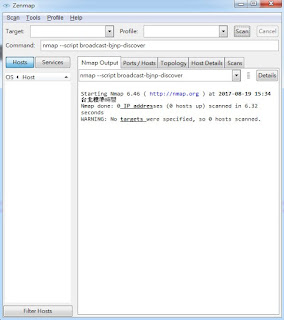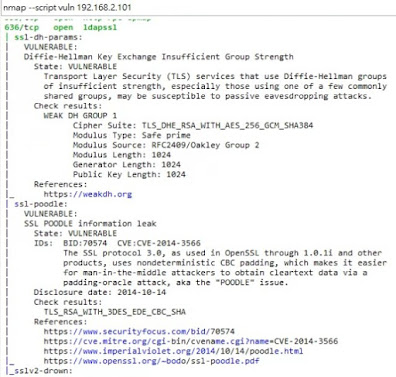broadcast-bjnp-discover.nse說明
這是 canon印表機 通訊協定the BJNP protocol , 用來查詢內網 是否存在這樣設備
執行:
官方網址: https://nmap.org/nsedoc/scripts/broadcast-bjnp-discover.html
內容:
description = [[
Attempts to discover Canon devices (Printers/Scanners) supporting the
BJNP protocol by sending BJNP Discover requests to the network
broadcast address for both ports associated with the protocol.
The script then attempts to retrieve the model, version and some additional
information for all discovered devices.
]]
---
-- @usage
-- nmap --script broadcast-bjnp-discover
--
-- @output
-- | broadcast-bjnp-discover:
-- | 192.168.0.10
-- | Printer
-- | Manufacturer: Canon
-- | Model: MG5200 series
-- | Description: Canon MG5200 series
-- | Firmware version: 1.050
-- | Command: BJL,BJRaster3,BSCCe,NCCe,IVEC,IVECPLI
-- | Scanner
-- | Manufacturer: Canon
-- | Model: MG5200 series
-- | Description: Canon MG5200 series
-- |_ Command: MultiPass 2.1,IVEC
--
-- @args broadcast-bjnp-discover.timeout specifies the amount of seconds to sniff
-- the network interface. (default 30s)
author = "Patrik Karlsson"
license = "Same as Nmap--See http://nmap.org/book/man-legal.html"
categories = {"safe", "broadcast"}
local bjnp = require("bjnp")
local stdnse = require("stdnse")
local coroutine = require("coroutine")
local nmap = require("nmap")
local table = require("table")
local printer_port = { number = 8611, protocol = "udp"}
local scanner_port = { number = 8612, protocol = "udp"}
local arg_timeout = stdnse.parse_timespec(stdnse.get_script_args(SCRIPT_NAME .. ".timeout"))
prerule = function()
if ( nmap.address_family() ~= 'inet' ) then
stdnse.print_debug("%s is IPv4 compatible only.", SCRIPT_NAME)
return false
end
return true
end
local function identifyDevices(devices, devtype)
local result
local port = ( "printers" == devtype and printer_port or scanner_port )
for _, ip in ipairs(devices or {}) do
local helper = bjnp.Helper:new({ ip = ip }, port)
if ( helper:connect() ) then
local status, attrs
if ( "printers" == devtype ) then
status, attrs = helper:getPrinterIdentity()
end
if ( "scanners" == devtype ) then
status, attrs = helper:getScannerIdentity()
end
if ( status ) then
result = result or {}
result[ip] = attrs
end
end
helper:close()
end
return result
end
local function identifyScanners(scanners)
return identifyDevices(scanners, "scanners")
end
local function identifyPrinters(printers)
return identifyDevices(printers, "printers")
end
local function getKeys(devices)
local dupes = {}
local function iter()
for k, _ in pairs(devices) do
for k2, _ in pairs(devices[k]) do
if ( not(dupes[k2]) ) then
dupes[k2] = true
coroutine.yield(k2)
end
end
end
coroutine.yield(nil)
end
return coroutine.wrap(iter)
end
local function getPrinters(devices)
local condvar = nmap.condvar(devices)
local helper = bjnp.Helper:new( { ip = "255.255.255.255" }, printer_port, { bcast = true, timeout = arg_timeout } )
if ( not(helper:connect()) ) then
condvar "signal"
return
end
local status, printers = helper:discoverPrinter()
helper:close()
if ( status ) then
devices["printers"] = identifyPrinters(printers)
end
condvar "signal"
end
local function getScanners(devices)
local condvar = nmap.condvar(devices)
local helper = bjnp.Helper:new( { ip = "255.255.255.255" }, scanner_port, { bcast = true, timeout = arg_timeout } )
if ( not(helper:connect()) ) then
condvar "signal"
return
end
local status, scanners = helper:discoverScanner()
helper:close()
if ( status ) then
devices["scanners"] = identifyScanners(scanners)
end
condvar "signal"
end
action = function()
arg_timeout = ( arg_timeout and arg_timeout * 1000 or 5000)
local devices, result, threads = {}, {}, {}
local condvar = nmap.condvar(devices)
local co = stdnse.new_thread(getPrinters, devices)
threads[co] = true
co = stdnse.new_thread(getScanners, devices)
threads[co] = true
while(next(threads)) do
for t in pairs(threads) do
threads[t] = ( coroutine.status(t) ~= "dead" ) and true or nil
end
if ( next(threads) ) then
condvar "wait"
end
end
for ip in getKeys(devices) do
local result_part = {}
local printer = ( devices["printers"] and devices["printers"][ip] )
local scanner = ( devices["scanners"] and devices["scanners"][ip] )
if ( printer ) then
printer.name = "Printer"
table.insert(result_part, printer)
end
if ( scanner ) then
scanner.name = "Scanner"
table.insert(result_part, scanner)
end
if ( #result_part > 0 ) then
result_part.name = ip
table.insert(result, result_part)
end
end
if ( result ) then
return stdnse.format_output(true, result)
end
end
執行:
nmap --script broadcast-bjnp-discover
官方網址: https://nmap.org/nsedoc/scripts/broadcast-bjnp-discover.html
內容:
description = [[
Attempts to discover Canon devices (Printers/Scanners) supporting the
BJNP protocol by sending BJNP Discover requests to the network
broadcast address for both ports associated with the protocol.
The script then attempts to retrieve the model, version and some additional
information for all discovered devices.
]]
---
-- @usage
-- nmap --script broadcast-bjnp-discover
--
-- @output
-- | broadcast-bjnp-discover:
-- | 192.168.0.10
-- | Printer
-- | Manufacturer: Canon
-- | Model: MG5200 series
-- | Description: Canon MG5200 series
-- | Firmware version: 1.050
-- | Command: BJL,BJRaster3,BSCCe,NCCe,IVEC,IVECPLI
-- | Scanner
-- | Manufacturer: Canon
-- | Model: MG5200 series
-- | Description: Canon MG5200 series
-- |_ Command: MultiPass 2.1,IVEC
--
-- @args broadcast-bjnp-discover.timeout specifies the amount of seconds to sniff
-- the network interface. (default 30s)
author = "Patrik Karlsson"
license = "Same as Nmap--See http://nmap.org/book/man-legal.html"
categories = {"safe", "broadcast"}
local bjnp = require("bjnp")
local stdnse = require("stdnse")
local coroutine = require("coroutine")
local nmap = require("nmap")
local table = require("table")
local printer_port = { number = 8611, protocol = "udp"}
local scanner_port = { number = 8612, protocol = "udp"}
local arg_timeout = stdnse.parse_timespec(stdnse.get_script_args(SCRIPT_NAME .. ".timeout"))
prerule = function()
if ( nmap.address_family() ~= 'inet' ) then
stdnse.print_debug("%s is IPv4 compatible only.", SCRIPT_NAME)
return false
end
return true
end
local function identifyDevices(devices, devtype)
local result
local port = ( "printers" == devtype and printer_port or scanner_port )
for _, ip in ipairs(devices or {}) do
local helper = bjnp.Helper:new({ ip = ip }, port)
if ( helper:connect() ) then
local status, attrs
if ( "printers" == devtype ) then
status, attrs = helper:getPrinterIdentity()
end
if ( "scanners" == devtype ) then
status, attrs = helper:getScannerIdentity()
end
if ( status ) then
result = result or {}
result[ip] = attrs
end
end
helper:close()
end
return result
end
local function identifyScanners(scanners)
return identifyDevices(scanners, "scanners")
end
local function identifyPrinters(printers)
return identifyDevices(printers, "printers")
end
local function getKeys(devices)
local dupes = {}
local function iter()
for k, _ in pairs(devices) do
for k2, _ in pairs(devices[k]) do
if ( not(dupes[k2]) ) then
dupes[k2] = true
coroutine.yield(k2)
end
end
end
coroutine.yield(nil)
end
return coroutine.wrap(iter)
end
local function getPrinters(devices)
local condvar = nmap.condvar(devices)
local helper = bjnp.Helper:new( { ip = "255.255.255.255" }, printer_port, { bcast = true, timeout = arg_timeout } )
if ( not(helper:connect()) ) then
condvar "signal"
return
end
local status, printers = helper:discoverPrinter()
helper:close()
if ( status ) then
devices["printers"] = identifyPrinters(printers)
end
condvar "signal"
end
local function getScanners(devices)
local condvar = nmap.condvar(devices)
local helper = bjnp.Helper:new( { ip = "255.255.255.255" }, scanner_port, { bcast = true, timeout = arg_timeout } )
if ( not(helper:connect()) ) then
condvar "signal"
return
end
local status, scanners = helper:discoverScanner()
helper:close()
if ( status ) then
devices["scanners"] = identifyScanners(scanners)
end
condvar "signal"
end
action = function()
arg_timeout = ( arg_timeout and arg_timeout * 1000 or 5000)
local devices, result, threads = {}, {}, {}
local condvar = nmap.condvar(devices)
local co = stdnse.new_thread(getPrinters, devices)
threads[co] = true
co = stdnse.new_thread(getScanners, devices)
threads[co] = true
while(next(threads)) do
for t in pairs(threads) do
threads[t] = ( coroutine.status(t) ~= "dead" ) and true or nil
end
if ( next(threads) ) then
condvar "wait"
end
end
for ip in getKeys(devices) do
local result_part = {}
local printer = ( devices["printers"] and devices["printers"][ip] )
local scanner = ( devices["scanners"] and devices["scanners"][ip] )
if ( printer ) then
printer.name = "Printer"
table.insert(result_part, printer)
end
if ( scanner ) then
scanner.name = "Scanner"
table.insert(result_part, scanner)
end
if ( #result_part > 0 ) then
result_part.name = ip
table.insert(result, result_part)
end
end
if ( result ) then
return stdnse.format_output(true, result)
end
end


留言
張貼留言